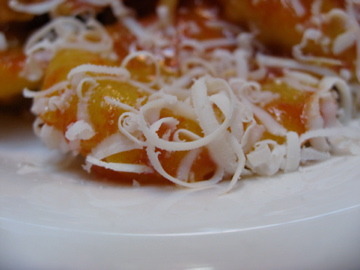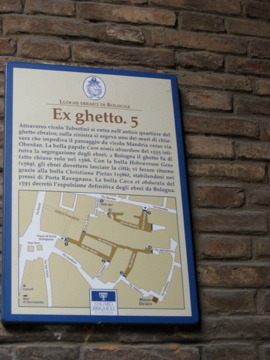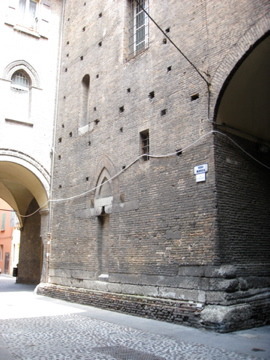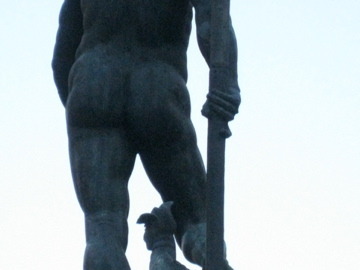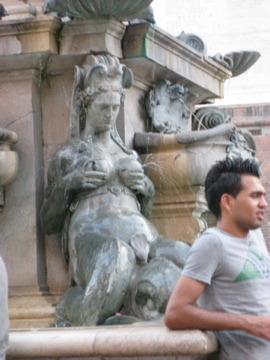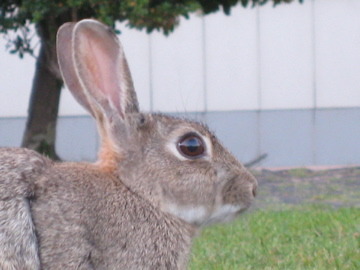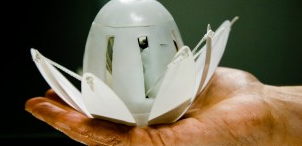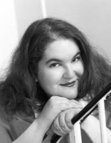Naomi Alderman's Blog, page 2
July 22, 2010
3: and every chapter must be so translated
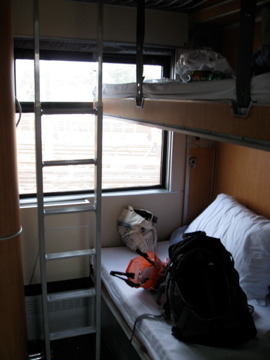
I travelled from Bologna to Paris today, on the train. Well, last night. Well, today. Forgive me, I'm a bit tired. The train was two hours late arriving at Bologna - hours I spent on a humid platform fending off beggars and weirdos, always fun to be a woman travelling alone - then it accumulated another couple of hours delay on the way across Europe. I was on the top bunk, which required a bit of an acrobatic feat every time I wanted to go to the (fetid) loo. (Actually I don't know why it was quite so horribly smelly, it was literally a seat over a hole onto the tracks. Nice.) And the bunk was uncomfortable, and the train kept jerking, and I got so little sleep I've spent the whole day literally room-spinningly-dizzy.
And yet, and yet, I loved it. I never did that inter-railing thing that everyone was doing when I was a teenager. Me and my friend Esther did a mammoth train trip around Scotland, but never the backpacking across the continent. Well, some experiences you missed as a teenager can't be recaptured, but some can. I want to do this again, something about the challenge of it, the exercise of rusty language skills, the encounters with strangers, the feeling of being in motion... wonderful.
Some of my best moments were translating between Italian-speakers and French-speakers. I wanted to go "you're both speaking Latin, for goodness' sake, surely you can understand each other?" But I really enjoyed helping out.
"Venti due," said the Italian train conductor, "venti due."
"Vingt deux," I translated for a grateful French lady.
Somehow, bliss.
July 19, 2010
2: è differente essere Ebrea
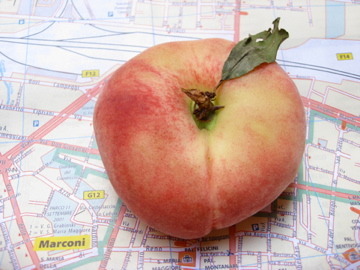
That is a peach. It is gorgeous. You can't smell it, but I could and it's the kind of food that makes you think "if I eat this, it will become part of me, that's just fantastic." Bologna is famous for its food. Obviously they invented Bolognese sauce (served here over golden yellow buttery melt-in-the-mouth tagliatelle, not spaghetti), but also apparently lasagne. And just down the road is Parma. As in Parma ham and Parmesan cheese. Basically everything here is amazing; the tomatoes are specially incredible this time of year, just so sweet.
So, I've had a lovely day wandering around - not just sampling the food - until the heat overcame me. Walking back to my hotel I spotted this:
OK, were you a geeky child? It will not surprise you to learn that I was. Did your parents take you on holidays to historic English towns and to museums and exhibits called things like "The Museum of the Wool Industry" or "The bubonic plague hits Cirencester" or "Medieval Hereford"? Mine, naturally, did. And did you find yourself thinking something like "wow, if I'd been here in Medieval times, I wonder what I would have been doing, would I have had to card wool like in that educational diorama?" Maybe you did: we're sort of encouraged to do that in GCSE History. Imagine that you are a street urchin; write 200 words about your daily life.
The thing is, my dad's an historian and knows a thing or two about what actually went on. So when I said to him "dad, if we'd lived in Victorian Bath/Medieval Worcester/Elizabethan Aberdeen, what would we have been doing? Would you still have been a professor? Would we I have had to get a job cleaning chimneys?", he'd generally reply "well, we'd have been Jewish, so it would have been different."
And it is. Everywhere, and everywhen, pretty much, except here and now it's been different. A parallel history. Here in Medieval and Renaissance Bologna there are people inventing lasagne and building towers and founding the world's first university and all sorts. And there are the Jews, in the ghetto.
I had a little explore of the ghetto - I might go back properly tomorrow. My guidebook had said it was "quiet" and they're not kidding. It's like the minute you step off the main streets and into the ghetto the sound is deadened. Presumably the walls are thicker - perhaps Jewish people wanted to protect themselves from attack, or the Bolognese built thicker to cut themselves off more firmly - but also there aren't so many shops. The buildings are closer together. The few people seem to speak more softly. The walls are high and the streets are narrow.
What is one to do with a history like this? To forget it seems an insult to those who lived it. To insist upon it seems churlish to a world which now says "no no, we're all the same, please accept our apologies and come and join in the fun. We have Parmesan cheese!" It is a big and unanswerable question. What to do with history?
July 18, 2010
1: a long way from home
I start rather more energetically than I mean to go on, because I think I spent only 40 seconds today in a place I've been before: the one familiar place was Gare de Lyon Paris, marching through in an attempt to composter mon billet (ma billet? why would a billet have a gender anyway?) and get on the train for Milan before they closed the platform. Eight hours on a train from Paris to Milan, an hour on a train from Milan to Bologna, a cab, a hotel, a short walk and then this:
Yes it is a male statue's nice naked bottom, what of it? However, just so as not to be sexist, here is a female statue with water squirting out of her nipples (are they called statues when they're on fountains? I can't call them 'fountains').
People in the somewhat-far-away past were a lot less prudish than people in the recent-past and than we imagine everyone before us was. I can't imagine someone getting permission from a city council to erect something this frankly (and slightly weirdly) sexual in the centre of town today.
I am in Bologna. I got here by train, all the way from London, with a night in Paris in the middle. I thought I would love that experience, and in fact I really did. I love the fact that I actually felt the miles go past. That, having travelled here, I have some idea of what's in between London and Bologna. (Lac du Bourget looks amazing.) Travelling by train is like browsing the world. It's all very well to be able to put yourself in a metal box, ascend several thousand feet above the earth's surface and then come back down exactly where you wanted to be. But some of the best discoveries are made when you weren't really looking for them. After today, I can say with certainty that the Alps are really blooming impressive, and that the houses south of them have a distinctly different look to those north. And that I want to do this again.
Shall we do it again?
Yes, I think we shall.
I've had that feeling creeping over me for a few weeks now. Staring at places I pass by but have never been into, remembering places I've been recommended. The other day, driving back home from central London I almost drove straight past Regent's Park and then I thought "I have literally never ever been to sit in Regent's Park." So I pulled over the car and sat under a tree for 20 minutes, watching the kids play football and the couples flirting. And thought, as I often think "why haven't I ever done this before?" And yes, I think it's time to start another Visiting New Places project.
Now, last time I did 31 places every day in August. However, I know that I'll be incommunicado for a lot of the first week of August. So. Let's start now, and I'll do 31 by the end of August. OK? As before:
- it doesn't have to be a long visit, five minutes will do
- I have to write something about the place
- it has to be somewhere I've never been before. but could be, eg, the gardens which I've never visited of a house I have visited. clear?
- a new place not a new activity
I'm sort of cheating, because currently I'm in foreign - a city I've never been to before - so the first few days will be a bit easy. Should I make it harder? I don't think so. Part of the joy of this last year was the 'found' visits; places I happened to be anyway, but related to differently because I was doing this. So, OK, off we go!
The rabbit above, btw, was photographed by me at the University of East Anglia. There are rabbits everywhere and if you sit very very still they will come right up to you. But it has to be very still. Like, not even turning the pages of a book. One of them hopped over my foot, another nibbled a page of the book I was (not) reading. It's here also to remind me of a post I must write entitled "the wisdom of Michele Roberts". Intriguing, eh?
OK, let's go.
June 20, 2010
wait until dark
Here's something people don't know about me: I'm a bit afraid of the dark. Not very afraid, not afraid like I really think there are monsters under the bed or in the wardrobe, not like I freak out if I'm in a tube train and the lights go off for a bit. But just, unsettled. Like a lot of people who grew up in the city, who've lived all their lives in the city, I find total darkness intimidating. Better if there's just a bit of light.
But somehow I don't like feeling like that. And so when I heard about a project that involved wandering round in pitch-darkness, I wanted to experience it for myself. Rather appropriately (or inappropriately?) for the longest days of the year, this weekend I visited The Question, a demonstration of what the organisers hope will become a larger project, open to the public. I hope it will too, it was magical.
The technological aspect is interesting - and I hope to write more about it - you're guided around the space by a mechanical lotus flower which opens and closes depending on how near you are to a 'zone of interest' - in these zones there are things to touch, and the headphones you're wearing play music or snippets of dialogue. But talking about the technology doesn't really get to the heart of the experience.
Here's what it's like. First of all, I felt nervous. A small group of us walked through the 'light lock'. The door closed behind us. The space really was black. It made no difference whether my eyes were open or closed, so I closed them. I shuffled forward. I had no idea of the size of room I was in, where the other people were or where I was. I held on tightly to the wall. I realised, comfortingly, that my hand was quite a good enough guide to lead me around the room. I became bolder. I walked a little more. I started to realise that I could hear things: other people, the faint hum of electronic devices, and feel things: the wall, the sensation of the floor, the lotus buzzing in my hand, and smell things: cologne, perfume. I realised that no one could see me - that there was nothing to be embarrassed about in my slow exploration, because no one was watching. My hands started to feel like eyes, mapping out the space, finding familiar and unfamiliar objects. I'm not sure I can quite convey how, over the half-hour 'performance', I began to understand the incredible richness of what we can sense without sight.
Yesterday evening, I began to get impatient for it to get dark. I wanted to turn off the lights, close the blackout curtains, and navigate my flat by the faint glimmer of light from the street, and touch, and sound. Darkness suddenly felt comforting, safe, less distracting than the gaudy day.
Another thing I noticed, from this altered perspective: as a culture we're afraid of the dark. Characters in movies and TV who go into dark rooms have horrible things happen to them. Our entertainment mostly takes the form of glowing backlit screens. We expend vast resources ensuring that our streets are never dark, that we can banish darkness at a touch of a button. I wonder if this is connected to a kind of superficiality, a constant obsession with what things look like. I close my eyes and the world feels more peaceful, more friendly. A bit of a revelation.

